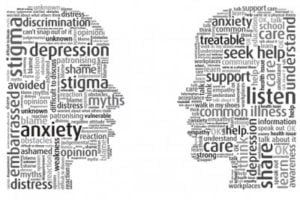Why Is Mental Health Such an Important Topic?
Mental Health used to be a taboo subject in society and for many people still is – something not to be spoken about or shared. Not anymore. The importance of talking about mental health cannot be emphasized enough. For one, mental health has a profound effect on the rest of your body and its physical health. And poor physical health can also negatively impact your mental health.
What are the facts and statistics of mental health in Canada?
‘Mental Illness’ is an umbrella term for a variety of disorders and challenges that many people experience at some point in their lives. They include depression, anxiety, schizophrenia, and bipolar disorder as well as anorexia and other eating disorders. According to MindYourMind.ca, referencing Statistics` Canada and the Mental Health Strategy for Canada, 1 in 5 Canadians will experience mental health issues in their lifetime. Does that number surprise you? These numbers are real and they are ever-increasing. Which means we need to be better equipped to help support those affected by mental health illnesses and put preventative strategies in place for ourselves.
How can we all contribute?
This year, Bell Canada is running a massive campaign to promote the discussion of mental health; the Let’s Talk campaign is also raising money for numerous mental health initiatives and charities. Their website and social media platforms are flooded with tips and advice on how every one of us can help those who are dealing with mental health difficulties. They also have a long list of resources and helplines for those directly impacted by mental health. Head over to their website at letstalk.bell.ca or their numerous social media platforms to ‘Join The Conversation’. But Mental Health shouldn\’t be something we discuss only today. It should be on the agenda every day.

How does mental health affect the body?
Although people associate mental health purely with the brain and how it affects a person’s thoughts, it can also have significant negative effects on one’s physical health. High blood pressure, increased risk of heart disease, and increased heart rate are just some of the side effects of mental health illnesses. Which is why it is so important that those suffering, do not suffer in silence. Talking openly about struggles and difficulties is the number 1 snippet of advice from professionals on dealing with mental health issues. Exercise and physical activity have also been proven to help improve symptoms of mental health; just a short 10-minute burst of exercise, such as brisk walking or running, can release endorphins known as the ‘happy hormone’, which can have a massive positive impact on mood and thought processes.
How does physical health impact mental health?
It is also extremely important to note that poor physical health can also affect your mental health; chronic pain and reduced mobility can lead to depression and anxiety. An unhealthy diet and lack of fitness regime can lead to eating disorders such as anorexia and bulimia. You can take precautions to reduce your risk of developing mental health issues. Physical activity can bring health benefits including elevating your mood and reducing your stress. Healthy eating also can improve mental health, demonstrating that a balanced and healthy lifestyle can help combat symptoms of mental health struggles. The key is to keep as active as your body allows you to, ensuring you are taking steps to align and balance your physical and mental health for the healthiest version of you! Try using a fitness tracker watch or app on your phone to help motivate you to set and smash goals and targets to improve your physical and mental fitness and wellbeing. Grabbing a friend to join you in keeping fit and active will also have a reinforcing positive effect on your overall wellbeing, as they can offer motivation, support, and as well as a listening ear.
How can Backs in Action help me to improve my physical and mental health?
Backs in Action offers a wide range of services to help on your wellness journey. These include: chiropractic care for various ailments, aches and pains; physiotherapy and kinesiology for increased mobility and movement; acupuncture for chronic pain, stress and anxiety and other physical and mental complaints; massage therapy
for aches and pains; and counselling services to help look after your mind as well as your body.
Our Registered Clinical Counsellor, Alison McCleary offers confidential counselling services and is qualified to deal with a variety of issues, including relationship struggles, post-traumatic stress symptoms (including car accidents), dealing with grief and loss, and stress and anxiety caused by daily life. She incorporates holistic, positive, goal-orientated approaches, and emotionally focused techniques to help people deal with struggles and challenges they might be facing.
Don’t suffer in silence. Don’t suffer alone. Let us help you improve your mental and physical wellbeing.
Updated January 23, 2020





